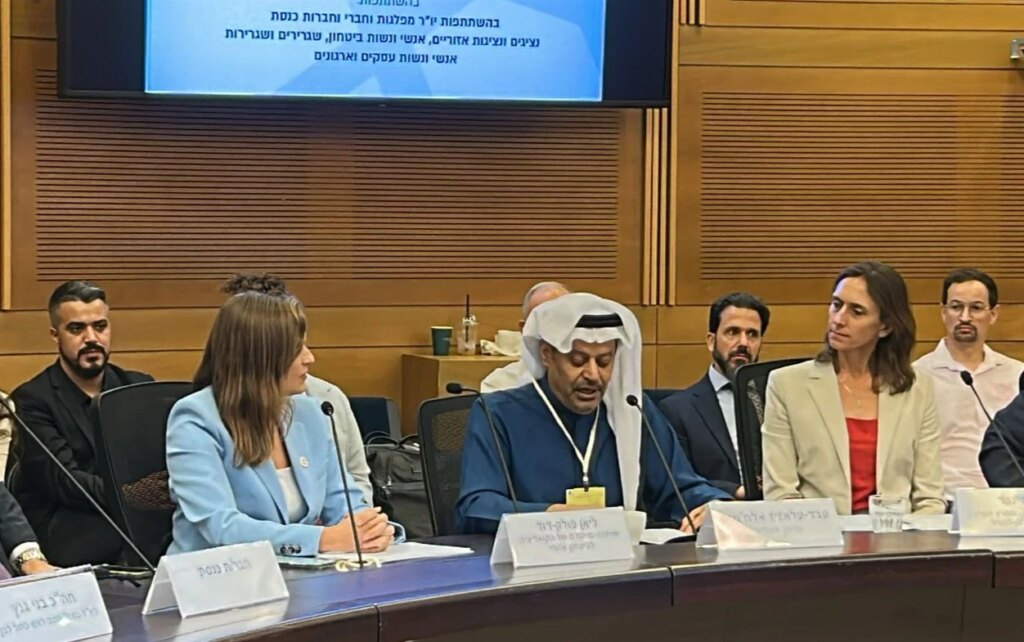A prominent Saudi journalist and a Syrian political activist visited Israel’s parliament on Wednesday, where they discussed coexistence and potential deals to build open relations between Israel and Arab countries.
Abdalaziz Alkhamis, a Saudi journalist and researcher specialising in the Middle East, and Shadi Martini, a Syrian businessman and activist, attended an event at the Knesset hosted by Israel’s Lobby for Advancing a Regional Security Arrangement.
Alkhamis told the event: “Israel enjoys unprecedented military dominance after defeating Iran.
“However, power that is not used for peace is ineffective. The victory on the battlefield must be translated into a vision. This is what is required. You have an opportunity.”
He added that the Abraham Accords, the name given to deals building open ties between Israel and four Arab countries in 2020, had “failed to prevent the region from igniting”.
New MEE newsletter: Jerusalem Dispatch
Sign up to get the latest insights and analysis on
Israel-Palestine, alongside Turkey Unpacked and other MEE newsletters
US President Donald Trump spearheaded the deals, which Israel signed with the United Arab Emirates, Bahrain, Morocco and Sudan.
“A decentralised Palestinian state must be established, with a clear Israeli commitment not only to security but also to coexistence. These are not big demands; this is the minimum and a humanitarian requirement,” Alkhamis said.
He said that Israel must “translate” its regional power “into a vision”.
‘No state can expect to be impressed when our people next door are encaged and disenfranchised’
– Abdalaziz Alkhamis, Saudi journalist
“Use your new strength to solve the problem, not to dominate. If Israel seizes this opportunity to deepen the occupation and humiliate Gaza, it will lose not only the Kingdom of Saudi Arabia but the entire Arab world,” he said.
“No state can expect to be impressed when our people next door are encaged and disenfranchised,” he added.
“Normalisation from Saudi Arabia’s perspective is not merely a dual agreement, but a regional realignment, and such realignment must include a credible and real path to Palestinian sovereignty.”
Saudi Arabia has long maintained that it wouldn’t normalise ties with Israel until Palestinians got their own state in line with the 1967 borders, with East Jerusalem as its capital.
The lobby hosting the event was jointly founded by Israeli opposition MPs Ram Ben Barak, Gilad Kariv and Alon Schuster.
‘Unique opportunity’
Martini, who fled Syria in 2012 during the civil war, told the event that he had met Ahmed al-Sharaa, Syria’s president, around two weeks ago.
“I was with two other colleagues, one is a priest, and one is a rabbi… We entered the presidential palace in Damascus. I really appreciated that meeting. It went on for two hours, and the topic of Israel was dominant,” Martini said.
“One thing that stuck with me that President al-Sharaa said was: ‘We only have these opportunities one time every 100 years, it’s a very unique opportunity – but the window will not always stay open.’”
It’s not clear what opportunity Sharaa was purportedly referring to in this conversation.
In April, Republican congressman Cory Mills said Sharaa told him in a meeting that Syria is prepared to normalise ties with Israel and join the Abraham Accords under the “right conditions”. Sharaa has not publicly confirmed such a position.

Syrians fear Israel normalisation could plunge the country back into war
Read More »
Syrians told Middle East Eye earlier this week that they feared that a normalisation deal with Israel could plunge the country back into war.
Israel and Syria have technically been at war since the first Arab-Israeli war in 1948.
A state of heightened tension and deep enmity between the two countries accelerated during the 1967 war, which also drew in Egypt and Jordan, and Israel’s subsequent occupation of the Syrian Golan Heights.
Hassan Nifi, a Syrian writer, told MEE that Sharaa would struggle to get popular approval for a normalisation deal, but if he miraculously went ahead with it, it would push the country to the brink.
“Public reaction would be overwhelmingly negative, especially with what’s happening in Gaza,” he said. “Everyone knows this [normalisation] deal would be entirely in Israel’s favour.”
Yair Lapid, the Israeli opposition leader, was also at the event in Israel’s parliament on Wednesday.
He said that if Sharaa were to cede Syria’s Golan Heights, an area occupied by Israel since 1967, then he intended for Israel to lead a regional effort to rebuild Syria.
“I told the Emiratis in Abu Dhabi: We will know how to build a complete regional coalition around [Sharaa] that will assist in the reconstruction of Syria if he takes the Golan Heights issue out of the equation,” Lapid said.
Sharaa’s family were displaced from the Golan Heights when Israel first occupied the raised plataeu.

